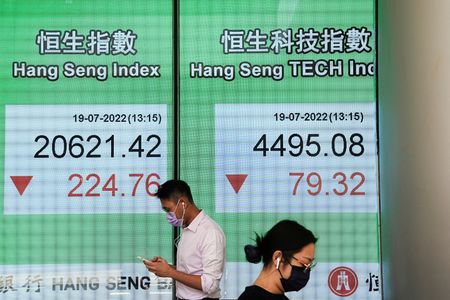 1
1 1
1

By Kevin Buckland
TOKYO (Reuters) – Asian stocks lost ground on Monday, retreating from over three-week highs as worries about a global economic downturn sapped investors’ risk appetite.
Bond yields eased amid bets that an expected U.S. recession would slow the Federal Reserve’s aggressive tightening campaign, with markets looking for policy clues from its two-day Federal Open Market Committee meeting which begins on Tuesday.
At the same time, the dollar built on its recovery from a 2-1/2-week low against major peers, supported by demand for the U.S. currency as a safe haven.
“Risk markets are obviously priced for some kind of slowdown, but are they priced for an outright recession? I would argue no,” said Ray Attrill, head of currency strategy at National Australia Bank.
“In that sense, it’s hard to say we’ve reached a bottom as far as risk sentiment is concerned.”
Japan’s Nikkei retreated 0.75%, while Chinese blue chips lost 0.82%.
Hong Kong’s Hang Seng slid 0.75%, with its tech index tumbling 1.96%.
MSCI’s broadest index of Asia-Pacific shares lost 0.54% to 158.80, after touching the highest since June 29 at 160.03 on Friday.
U.S. S&P 500 emini futures slipped 0.08%, pointing to an extension of the benchmark’s 0.93% slump on Friday, when a survey showed business activity contracting for the first time in nearly two years amid persistently heated inflation and rapidly rising interest rates.
Earlier that day, data also showed euro zone business activity unexpectedly shrank.
Nasdaq futures were about flat, following a 1.77% tumble for the tech-heavy stock index, as the bottom dropped out from under Snap Inc after the Snapchat owner posted its weakest-ever sales growth. [.N]
Investors are on guard this week for how much a strong dollar will hurt financial results from heavyweights Apple and Microsoft, among others.
In Europe, EURO STOXX 50 index futures pointed 0.61% lower, and FTSE futures slid 0.52%.
The dollar index – which measures the safe-haven currency against six major peers – was little changed at 106.64, after climbing off a 2-1/2-week low of 106.10 reached Friday.
The greenback added 0.11% to 136.235 yen, while the euro slipped 0.04% to $1.02075.
The 10-year U.S. Treasury yield was little changed at 2.785% after sliding from as high as 3.083% over the previous two sessions.
Equivalent Japanese government bond yields dropped to the lowest since March 10 at 0.18%, and Australian yields dipped to the lowest since May 31 at 3.285%.
The Fed concludes a two-day meeting on Wednesday and markets are priced for a 75 basis-point rate hike, with about a 9% chance of a full one percentage-point increase.
Crude oil fell on concern that higher U.S. rates would limit fuel demand growth.
Brent crude futures for September settlement dropped 48 cents, or 0.5%, to $102.72 a barrel and U.S. West Texas Intermediate (WTI) crude futures for September delivery fell 65 cents, or 0.7%, to $94.05 a barrel, both down for a fourth day.
Gold was steady at $1,725.17 per ounce, getting support from lower bond yields.
Bullion could push through resistance at around $1,770 if the Fed delivers a “dovish hike” on Wednesday, meaning forward guidance for a slowing in the pace of hikes for the remainder of the year, Chris Weston, head of research at brokerage Pepperstone, wrote in a client note.
“The yellow rock works in this backdrop where traders are questioning if the USD is our default hedge against equity drawdown,” Weston said.
“I am warming to gold.”
(Reporting by Kevin Buckland; Editing by Shri Navaratnam and Sonali Desai)